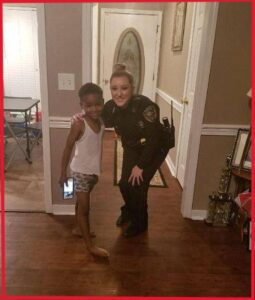He Called 911 Because He Was Hungry—But What Happened Next Started a Movement

It was nearing 9:30 p.m. when I had just tucked my youngest in for the night and received a call from dispatch: a child had dialed 911, but no one spoke on the other end.
I drove out to a small, dimly lit home tucked into the corner of my patrol zone. Nothing seemed out of place. But when I knocked, the door creaked open to reveal a young boy—barefoot, clutching a phone like it was his most valuable treasure.
He looked me in the eye and simply said, “I’m hungry.”
My stomach sank.
He was alone with his little sister, who was fast asleep in the back room. No adult was home. The kitchen was tidy but nearly empty—just an old container of milk and a few ketchup packets sat lonely in the fridge.
When I gently asked where his parents were, the boy glanced down and shrugged.
I asked if I could take a picture with him—not for social media, but to remember this moment. He smiled for the first time.
His name was Mateo. Eight years old. His sister, Sofia, was five. He explained that their mother worked double shifts, often late into the night, and had left early that morning. She hadn’t returned. He was used to helping his sister, he said—but tonight, even the peanut butter jar was scraped clean.
I called for support—not to file a report, but to bring food.
Minutes later, an ambulance pulled up. Among the responders was Rosa, a paramedic who’d caught wind of the call. She had packed granola bars, sandwiches, and juice bottles in a paper bag just in case.
Rosa knelt beside Mateo and handed him a warm sandwich. He didn’t eat it right away—he first set one aside for Sofia.
“I should wake her up,” he whispered.
“No need,” Rosa replied softly. “She can eat when she wakes.”
Mateo hesitated, then took a bite. As he chewed, I saw a quiet wave of relief pass over his face. You could tell he had been holding himself together all day.
Rosa and I shared a glance. We knew we couldn’t just walk away from these kids. Not tonight.
“I’ll stay with them until social services arrive,” Rosa offered. “You try to find their mom.”
Mateo mentioned that his mom worked at Joe’s Diner but didn’t carry her phone at work—it wasn’t allowed. That tiny clue gave us hope. I radioed the dispatcher to send someone over.
About twenty minutes later, confirmation came: she was there—and in tears. She had realized hours earlier she’d left her phone at home and had no way to check on her kids. When she was told they were safe, she broke down, begging to speak to them.
When Mateo heard her voice, his whole demeanor changed. He talked quickly, telling her about the sandwich, about Rosa, about how things were okay now. His love for her was undeniable.
By the time she got home, social services had been notified, but they decided not to take action. Instead, she was given information on support programs in the area. Rosa handed her a flyer before leaving.
That night, as I drove away, I couldn’t stop thinking about Mateo. About that sandwich. About how close this family was to slipping through the cracks.
Two weeks later, Rosa showed up at the station—not in uniform, but with a bright yellow sweater and a box of homemade cookies.
“I couldn’t stop thinking about those kids,” she told me. “So I decided to do something.”
She had rallied a group of off-duty firefighters, nurses, and EMTs to launch a volunteer initiative called Midnight Meals. Every Friday night, they’d deliver care packages—filled with snacks, hygiene items, and notes of encouragement—to local families in need.
The response was overwhelming. Teachers donated books. Store owners offered canned goods. Teenagers helped with sorting and packing. What started as one sandwich in one quiet house turned into something so much bigger.
A few months later, Rosa invited me to ride along on a delivery. Our last stop? Mateo and Sofia’s home.
He wasn’t barefoot this time. His mother greeted us at the door with a warm smile. The house was decorated with holiday lights and a small tree from a local charity. The kitchen table was filled with bread, fruit, and snacks from Midnight Meals.
Mateo proudly showed off a school project while his mom thanked us—not just for that night, but for what followed. Rosa gave him a brand-new backpack filled with school supplies. He hugged her tightly, tears in his eyes.
“Thank you,” he said softly. “For everything.”
On our way back, Rosa and I talked about the job. About the tough nights. The heartbreak. But also about nights like this one—nights that reminded us why we do what we do.
Sometimes, the biggest changes begin with the smallest gestures—a phone call, a sandwich, a smile.
If this story touched you, please share it. Let’s keep the kindness going. You never know what kind of difference you might make. ❤️